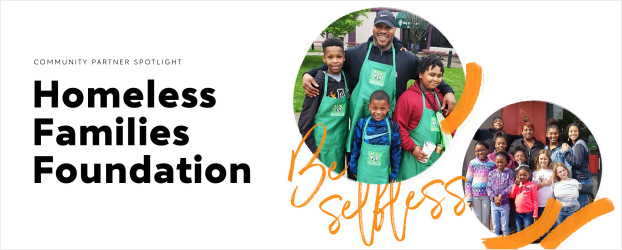Homeless Families Foundation Addresses an Overwhelming Need
Since 1986, the Homeless Families Foundation (HFF) of Columbus has worked to end homelessness through a two-pronged approach: rehouse families and prevent them from relapsing into housing instability. Here, we chat with Beth Retzer-Rice, executive director of HFF, about homelessness in Columbus and the steps we can take to help our neighbors.

Beth Fetzer-Rice has a knack for simplifying a big issue.
“At the end of the day, the way you end homelessness is through housing, and we have an affordable housing crisis,” she says. “And here’s the thing: Every community — yes, every community — has folks who need affordable housing.”
As the executive director of Columbus' Homeless Families Foundation (HFF), she knows first-hand how housing insecurity can plague a family — and a community. Every year, about 1,200 families and 3,000 children are homeless in Columbus.
“There’s an overwhelming need,” Fetzer-Rice says. “And we’re talking about a basic need like no other. The ways in which we take care of our neighbors say a lot about who we are as a society.”
The Solution Lies with Family Stability
Since 1986, HFF has worked to end homelessness through a two-pronged approach: Rehouse families and prevent them from relapsing into housing instability.
Fetzer-Rice and her team focus on three key areas: housing, education and family programming. Through crisis intervention, literacy programs, workforce training, parenting education and mental health assessments and counseling, they help families address the many factors that can affect stability.
The foundation’s housing programs include:
- Rapid Rehousing: HFF helps families move into stable housing and supports them in their work to become self-sufficient.
- Beyond Housing: The team works to break the generational cycle of homelessness by helping families overcome the challenges that threaten their stability.
- Healthy Beginnings at Home (HBAH): In collaboration with CelebrateOne, HFF works directly with pregnant women experiencing housing instability.
“Our family stability programming really fills in the gaps that government programs can’t,” says Fetzer-Rice, who joined HFF in 2016 after 20 years with the Salvation Army. “Government funding does the heavy lifting, but they have limits. Our foundation funds are more flexible, which helps us individualize services that may have limitations for government funds.”
For instance, Fetzer-Rice says, a family making just over the government guidelines for support wouldn’t qualify for federal assistance. But that doesn’t mean they don’t need it.
“We see a great deal of development targeting people at 80 to 90 percent of the median income. Our families are right around 30 percent,” Fetzer-Rice says. “We need affordable housing at all income levels.”
This year, HFF launched a housing program with the Ohio State University called Success Bridge. The program helps students in danger of dropping out of college because of unstable housing.
“We have a foot in both worlds: the homelessness system proper, such as shelters, and wraparound stability services we offer upstream. Success Bridge is one example of this,” Fetzer-Rice says. “If we can keep people from needing to use the shelter, we want to do that. We work along the entire continuum of housing.”
Success Bridge had 14 referrals in its first two weeks, and Fetzer-Rice and team are hoping they’ll be able to prove the program’s success and scale it up in the coming months.
Education is an Equalizer
The foundation’s Dowd Education Center, located in Franklinton, is open to all children participating in their housing first program, as well as those who live in one of Columbus’ West Side neighborhoods and are at risk of housing instability. Their focus is STEAM — science, technology, engineering, art and mathematics — as well as overall youth empowerment.
“We see ourselves as an extension of the classroom. The value we bring is in our ability to also focus on the social and emotional education these kids need,” Fetzer-Rice says. “We help them develop the soft skills they’ll need in life, and help them look toward the horizon, to picture their career or their educational paths.”
The foundation launched its first children’s program, a two-week summer camp, in 1991. That program has since developed into a fully licensed afterschool and summer education program, for students in kindergarten through middle school. In 2014, HFF added the Supporting Partnerships to Assure Ready Kids (SPARK) program to their education lineup. The goal of this home-visit program is to improve school readiness for children not given the opportunity to participate in traditional early learning programs.
It’s simple math: A lot of people simply don’t make enough to live on, let alone deal with a crisis.
Beth Fetzer-RiceAs the executive director of Columbus' Homeless Families Foundation
To End Housing Instability, We Need to Dispel Some Myths
There are many myths about homelessness Fetzer-Rice would like to eradicate.
“For one, for the large majority of our families — more than 80 percent — at least one member of the family works,” Fetzer-Rice says. “But, they’re often not making a living wage. It’s simple math: A lot of people simply don’t make enough to live on, let alone deal with a crisis.”
The COVID-19 pandemic is a crisis that has, of course, resulted in extreme instability for many families in our community.
“The people who work service jobs, the people you see every day — these are our family members,” Fetzer-Rice says. “They’re already working low-paying jobs, and now those have been eliminated or their hours have been severely cut back.”
Another myth: Eviction is a rare occurrence in which an individual is to blame.
“Our families average two evictions by the time they come to meet with us,” Fetzer-Rice says. “You can see a clear pattern: They work a minimum-wage service job, access housing, lose that job and get evicted. It’s a failure of systems, not of people.”
Most families experience housing instability as a result of a financial crisis, medical issues or domestic conflict. The majority have already lived in independent housing and are likely to return to self-sufficiency with assistance.
Asked what she wishes more people knew about housing instability, Fetzer-Rice doesn’t miss a beat: It affects every community, and the best solution is ensuring affordable housing for everyone.
“I believe,” she says, “housing is a basic human right.”
Visit HFF to learn more about the organization — and how you can support their efforts in our community.
The latest healthcare insights, floated right to your inbox.



